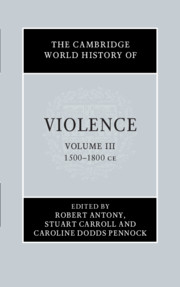Book contents
- The Cambridge World History of Violence
- The Cambridge World History of Violence
- The Cambridge World History of Violence
- Copyright page
- Contents
- Figures
- Maps
- Contributors to Volume iii
- Introduction to Volume iii
- Part I Empire, Race and Ethnicity
- Part II Cultures of War and Violence
- Part III Intimate and Gendered Violence
- Part IV The State, Punishment and Justice
- Part V Popular Protest and Resistance
- Part VI Religious and Sacred Violence
- Part VII Representations and Constructions of Violence
- Index
Introduction to Volume iii
Published online by Cambridge University Press: 13 March 2020
- The Cambridge World History of Violence
- The Cambridge World History of Violence
- The Cambridge World History of Violence
- Copyright page
- Contents
- Figures
- Maps
- Contributors to Volume iii
- Introduction to Volume iii
- Part I Empire, Race and Ethnicity
- Part II Cultures of War and Violence
- Part III Intimate and Gendered Violence
- Part IV The State, Punishment and Justice
- Part V Popular Protest and Resistance
- Part VI Religious and Sacred Violence
- Part VII Representations and Constructions of Violence
- Index
Summary
In world history early modernity is a contested category. However, it is commonly accepted that the period from about 1500 to 1800 is a distinct period, bookended by two significant periods of violence. The pattern of long-distance travel that was a feature of the fifteenth century ushered in a period of imperial conquest. The lives of millions of people across the globe were fundamentally transformed between 1500 and 1800 by mass violence, a consequence of European colonisation and enslavement. At the end of this time the Atlantic Revolutions violently overthrow the old order. But early modernity is not simply a period of time. In the period from 1500 to 1800 the problem of violence necessitated asking fundamental questions and formulating answers about the most basic forms of human organisation and interactions, such as the problem of civility in society, the nature of political sovereignty and the power of the state, the legitimacy of conquest and subjugation, the possibilities of popular resistance, and the manifestations of ethnic and racial unrest. Violence also provided the raw material for profound meditations on humanity and for examining our relationship to the divine and natural worlds.
Keywords
- Type
- Chapter
- Information
- The Cambridge World History of Violence , pp. 1 - 14Publisher: Cambridge University PressPrint publication year: 2020

